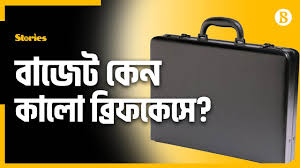
Why budget in briefcase

The finance minister got out of the car with a mysterious smile on his face. Briefcase in hand. This scenario seems to be repeated again and again on budget days in all countries of the world for ages. Millions of rupees in hand briefcases, but not in coins, in printed speeches. The Finance Minister entered the Parliament and stated the amount of that money. It is interesting to know when the tradition of this briefcase of finance ministers started.
The briefcase is mentioned in Akbar Ali Khan's latest book, Budget in Bangladesh: Economy and Politics, a financial adviser to the former caretaker government. According to the book, England's economy grew much larger after the Industrial Revolution. Budget proposals could not be packed in just one wallet. That's why briefcases come in the place of wallets.
The book mentions another reason for using the briefcase. That is, it is essential to maintain the confidentiality of any tax increase or decrease in the budget. Traders can use the information inside the briefcase overnight knowing any budget information. Therefore, I want to keep the proposals secret before presenting the budget in the parliament for a good reason. It is not possible for a finance minister to fulfill the responsibilities of a finance minister who cannot maintain the secrecy of the budget.
It is known that this style of budget briefcase started from 18th century. The first started from the United Kingdom. The budget chief was asked to open the briefcase and present the budget. In 180, William E. Gladstone, Britain's chief budget officer, brought budget documents in a "red suitcase". The suitcase was emblazoned with gold on the queen's face. The same bag was used during the tenure of many governments.
Editor & Publisher: S. M. Mesbah Uddin
Published by the Editor from House-45,
Road-3, Section-12, Pallabi, Mirpur
Dhaka-1216, Bangladesh
Call: +01713180024 & 0167 538 3357
News & Commercial Office :
Phone: 096 9612 7234 & 096 1175 5298
e-mail: [email protected]
HAC & Marketing (Advertisement)
Call: 01616 521 297
e-mail: [email protected]